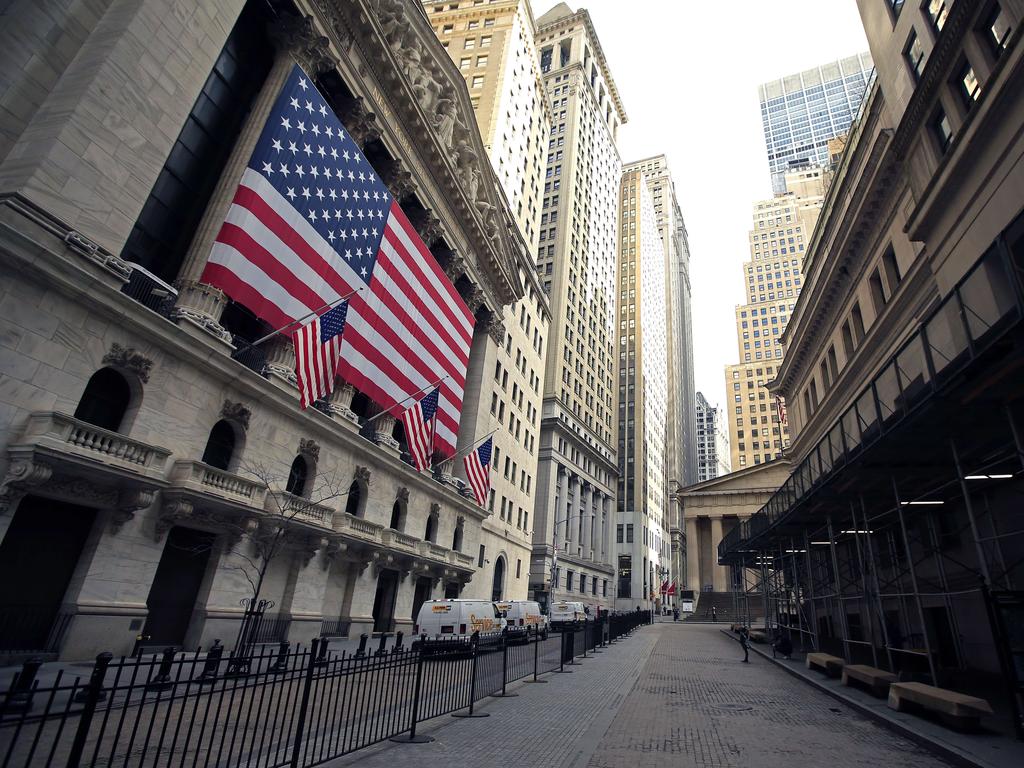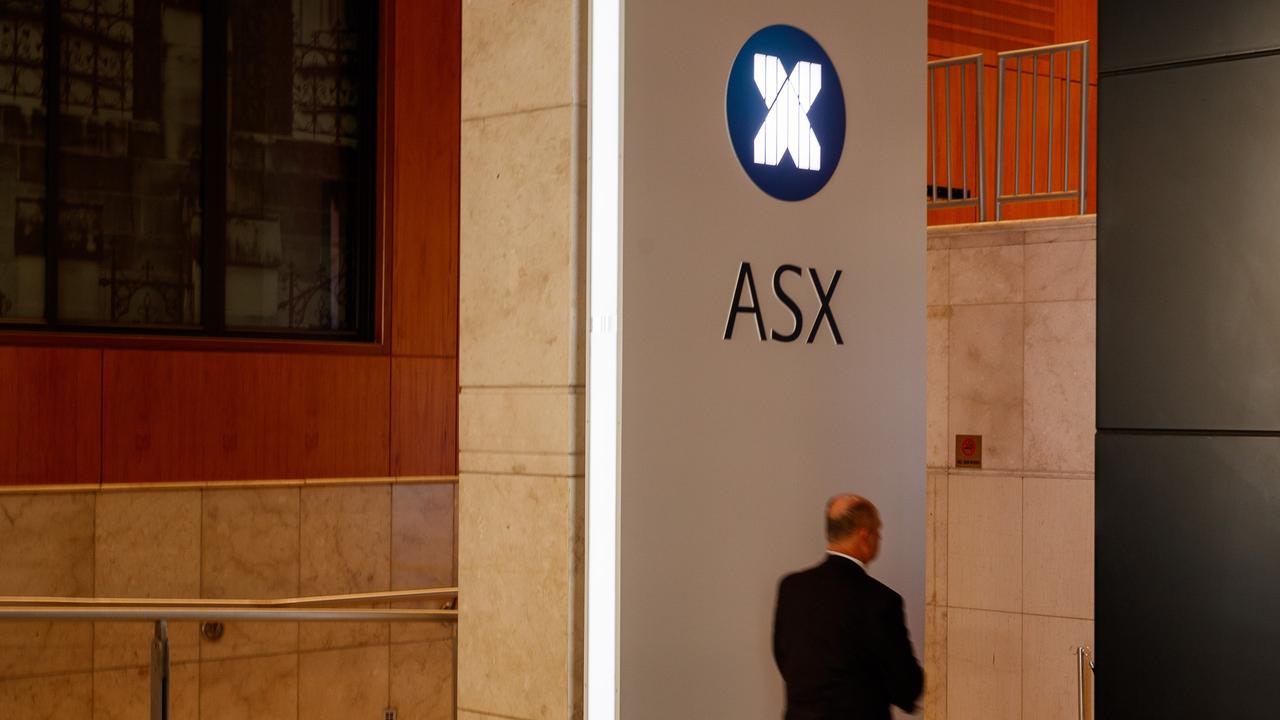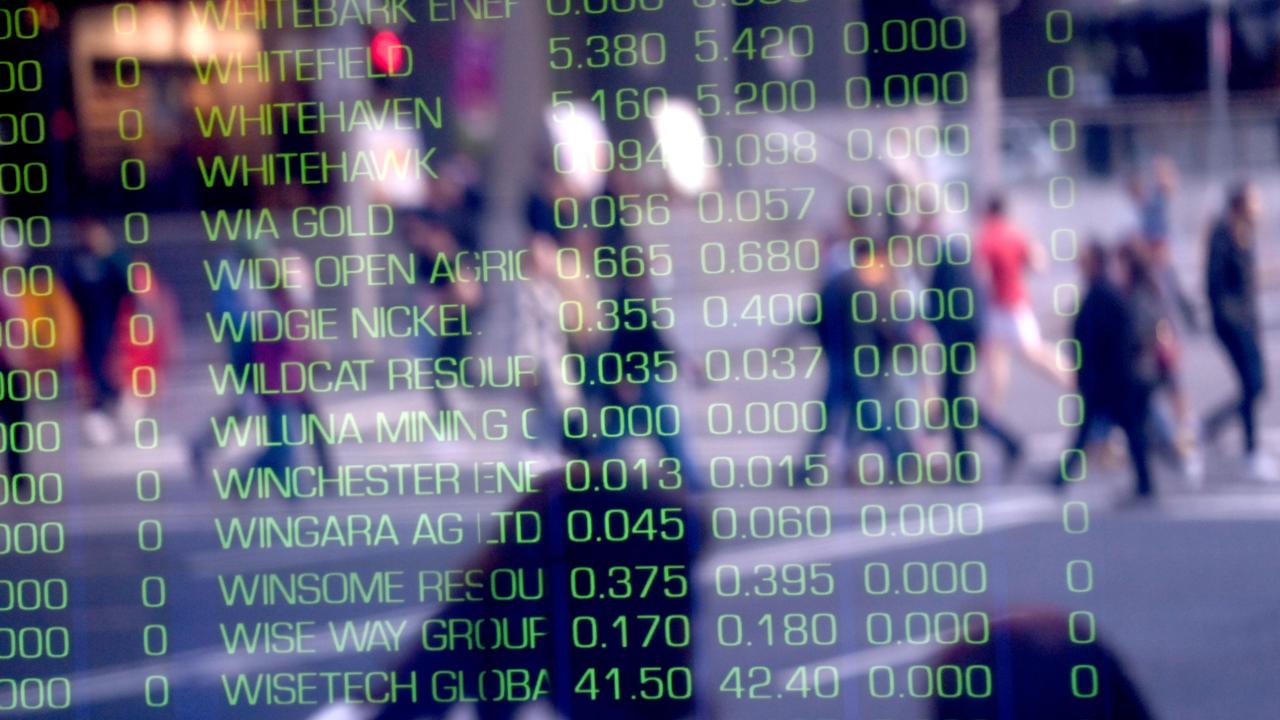ASX rallies to six-week high for best month on record
Shares notched their best month on record to rebound from a horror March, closing at a six-week high thanks to further recovery in US oil prices.
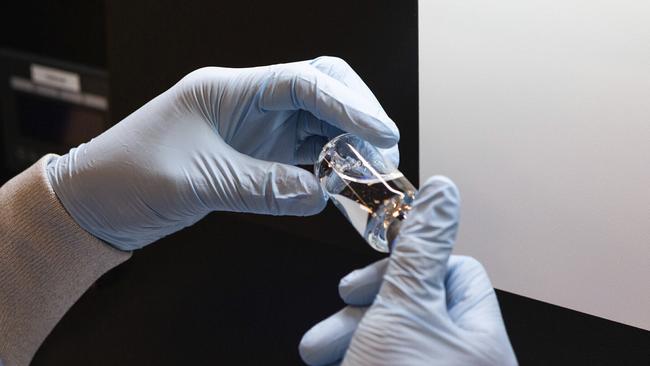
- Shares jump to biggest monthly rise on record
- $900m of ANZ dividends in limbo
- Woolies warns of higher costs from coronavirus
- Newcrest raising $1.1bn for Ecuadorean gold mine
Good night from the Trading Day blog for Thursday, April 30. The ASX was awash with green, closing up 2.4 per cent at a six-week high and notching an 8.8pc gain for the month – its best monthly lift on record.
Hopes of continued US Fed stimulus and positive signs about a coronavirus treatment were the key drivers, while locally, ANZ posted a 60pc profit drop and deferred the decision on its interim dividend, and Woolworths warned of growing costs associated with coronavirus. A $1.1bn raise by gold miner Newcrest weighed on the gold sector.
US futures are pointing to further gains ahead, as S&P 500 futures trade up 0.3pc.
Joyce Moullakis 9.00pm: ANZ’s smart move on dividend
ANZ is playing a long-term game by pushing out a half-year dividend decision to August, opting not to declare a payment in the eye of the COVID-19 storm.
In some respects — despite raising the ire of retiree investors and others relying on the regular payments — the deferral is a smart move. With winter in Australia starting in a little over four weeks, the risk of a second wave of coronavirus infections remains.
The David Gonski-led ANZ board is of the view that a few more months will provide further clarity around how the economy is managing the pandemic’s fallout — particularly if restrictions are eased — and whether an interim dividend is viable.
It’s a bold move for ANZ, which has paid a dividend to shareholders every six months since 1979. During the recession in the early nineties the bank reduced its biannual dividend to 16c per share in 1991 then again cut to 10c in the latter half of that year.
8.38pm: CBA sees US dollar, economy under pressure
Commonwealth Bank’s Global Markets Research team says the US dollar continues to trade on the defensive. “Reports of a potential treatment for the coronavirus and ultra‑loose global monetary policy settings are weighing on USD. The FOMC’s dovish tone suggests policy will stay very accommodative for a long time,” says Elias Haddad. “US jobless claims reports will highlight the considerable downside risk facing the US economy. Based on already released state data, we estimate continuing jobless claims to rise by roughly five million to 21 million in the week ending 18 April (consensus: 19.5 million),” he said.
“A further pick‑up in continuing jobless claims would suggest the April official unemployment rate can spike from the current level of 4.4 per cent to well above 20 per cent.”
8.24pm: Shell cuts dividend; first time since WWII
Royal Dutch Shell, one of the world’s largest oil and gas companies, released its first quarter 2020 results on Thursday. The company cut its dividend for the first time since World War II after first-quarter profits fell by nearly half as the coronavirus pandemic hit. Oil demand and crude prices have collapsed in recent months with coronavirus-driven lockdowns suffocating transport and industrial activity.
Dow Jones Newswires
David Ross 8.09pm: Bupa swamped with assistance requests
Australia’s largest health insurer, Bupa, has had more than 22,000 applications for assistance since it launched its program a month ago, setting aside $50m to help customers as part of broader moves from the private health insurance industry.
Premium increases have been frozen for six months as the coronavirus crisis hits the economy and customers with job losses, retail shutdowns and health concerns.
Other insurers are offering additional premium discounts or policy suspensions, with some even offering healthcare to those who have suspended their policies.
Mackenzie Scott 7.52pm: Coronavirus crisis hits rental property market
The combination of rising job losses, a pause in the arrival of international students, and tourism stays being converted to longer-term accommodation has caused the number of rentals properties to climb.
Analysing preliminary data from the week ending 22 March to the week ending 26 April, when lockdown restrictions took effect the economic fallout began to become more visible, the number of rental properties in the usually highly sought after inner-city regions of Melbourne and Sydney have risen by 36.2 per cent and 34.1 per cent respectively.
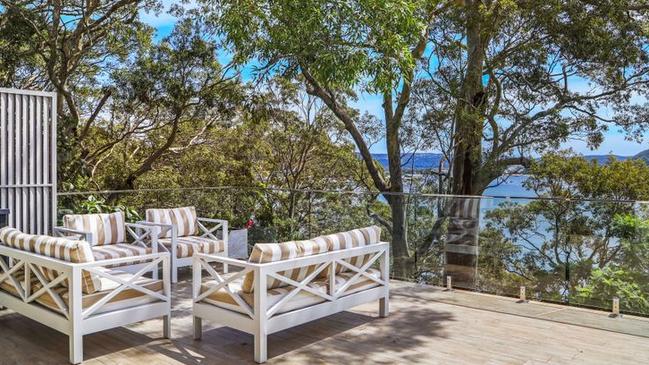
Cliona O’Dowd 7.26pm: Name and shame laggard super funds
Super funds that drag their heels on paying out members’ savings as part of the government’s early access scheme will soon be named and shamed by the banking regulator.
The Australian Prudential Regulation Authority began collecting data from super trustees this week to gain insight into how the process is working on a fund and industry level.
Super funds are required to provide, on a weekly basis, a range of data to the regulator, including how many members apply for early access to their nest eggs, the amount paid out to members, and processing times of payments.
Glenda Korporaal 7.15pm: Super Cbus looking to invest more
With the prospect of a multi-billion-dollar cash drain from early super withdrawals receding, the $52bn construction industry super Cbus is gearing up for more investment in infrastructure, corporate debt, shares and social housing projects.
In an interview with the Australian, Cbus chief investment officer Kristian Fok said the fund had a “couple of billion dollars” available which could be invested in corporate debt financing, equities and other long-term opportunities.
Mr Fok said possible projects included an investment in a new Melbourne airport to city rail link, as well as co-investment deals with state governments such as the recent deal between Cbus Property and the South Australian government for a $300m office building development in Adelaide.
6.57pm: Europe markets gaining, US futures positive
S&P 500 futures inched up 0.5 per cent, suggesting US markets could open higher. In Europe, the pan-continental Stoxx Europe 600 added 0.6 per cent and the FTSE 100 opened slightly up.
Stock benchmarks in China and Japan rose. The Shanghai Composite Index was up 1.3 per cent and Japan’s Nikkei 225 climbed 2.1 per cent. Markets in Hong Kong and South Korea were closed for a holiday.
German jobless claims rose sharply and much more than expected in April, showing the impact of the coronavirus pandemic on the German labour market.
Jobless claims rose by 373,000 in April after rising by 1000 in March, the Federal Employment Agency said on Thursday. Economists polled by The Wall Street Journal had forecast an increase of 95,000.
The adjusted unemployment rate increased to 5.8 per cent, the agency said, above the 5.2 per cent forecast by economists polled by the Journal.
The number of registered job vacancies stood at 626,000 in April, down 169,000 on the year, the agency said.
Dow Jones Newswires
6.45pm: BoJ may hold emergency meet on virus response
The Bank of Japan may hold an emergency meeting to announce new measures to provide additional financial support to companies affected by the novel coronavirus, Governor Haruhiko Kuroda suggested on Thursday.
At the BOJ’s last meeting on Monday, Mr Kuroda instructed his staff to swiftly consider measures to provide funds to banks so they can extend more loans to smaller companies affected by the virus.
Mr Kuroda told parliament on Thursday that the bank might announce new measures before its next meeting on June 15-16. It has no policy-setting meeting slated for May.
Dow Jones Newswires
6.37pm: Listen to the Money Cafe podcast
Wealth editor James Kirby and InvestSMART’s Alan Kohler give you this week’s Money Cafe about weasel words and banking dividends, could Australia escape a recession and are markets punting on a Crown takeover?
Here’s this week’s Money Cafe, in which James and Alan discuss:
- The market punting on a takeover bid for Crown
- Australia’s chances of escaping a recession amid the global meltdown
- Active vs passive funds in relation to superannuation
- Positive news on COVID-19 treatments at home and abroad
- How potential tax reform post-COVID-19 might affect the property market
- NAB’s dividend cut and the impact on retail shareholders
- The option of currency hedged ETFs
Nick Evans 5.34pm: Fortescue legal stoush over pricing info
Fortescue Metals Group is embroiled in a legal dispute with two companies running benchmark iron ore indexes over publication of its price data, according to US legal filings.
According to legal documents filed by S&P Global, publisher of the long-running Platts iron ore price - the benchmark index for both iron ore sellers and buyers - Fortescue has taken the unusual step of seeking to prevent the publication of pricing of its Pilbara iron ore.
Documents filed by S&P Global in New York show Fortescue won orders from the UK courts on April 24, preventing it from publishing “confidential” information about the discount from the benchmark received by Chinese customers for Fortescue’s ore - which, according to the publisher’s filings, show Fortescue’s discounts were narrowing when the legal action was launched.
4.51pm: Blind faith signals more gains to come
The local market looked through weak economic data and company results to continue it rally higher, a move Bell Potter head of institutional sales, Richard Coppleson, notes could be signs of further gains ahead.
He points out that US GDP printed at its lowest since 2009, while US personal consumption was its lowest in 40 years – still global markets all marched higher.
“One sign that we look for when watching markets is how they react to good news or bad news as a way of determining if they are likely to continue their rally or continue their sell-offs,” he writes.
“One of the best is that when bad news hits and markets go up – then that is a very positive sign that the short term move will continue to be up.”
He pointed out that even cruise ship operators and airlines joined the rally in the US, with similar broad gains across the local market.
Here’s the biggest movers at the close:
4.12pm: Shares jump to six-week high
The local market soared by 2.4 per cent on Thursday to cap out its best month on record, rebounding from a horror performance in March.
Shares lifted across all sectors bar health care and utilities, with outperformance in energy thanks to a renewed recovery in US oil prices.
By the close on Thursday, the ASX200 was up by 2.39 per cent or 129 points to a six-week high of 5522.4, after setting highs as much as 5549.1.
The strong finish cements a 8.8 per cent lift for the market in April – with much of the past week’s rally thanks to continued progress against coronavirus locally.
4.08pm: French GDP drop worst on record
France’s gross domestic product contracted 5.8 per cent in the first quarter, largely because of the coronavirus lockdown imposed since mid-March, the national statistics agency said Thursday.
The drop is the biggest since quarterly GDP evaluations began in 1949, exceeding the third quarter 1.6 per cent drop in 2009 and the 5.3 per cent contraction in the second quarter of 1968, the agency said.
AFP
4.01pm: Focus on enduring thematics: Aviva
Predicting long-term shifts in thematics caused by coronavirus is difficult, and a better question is “what won’t change”, so says Aviva Investors fund manage Giles Parkinson.
In a note he writes the global shift to electronic payments is here to stay.
“One thing that is not going to change is the demise of physical cash and cheques relative to electronic payments such as debit and credit cards,” he says.
“That has long been the direction of travel. Regulatory authorities prefer electronic payments as they are easier to monitor, and the rise of e-commerce at the expense of bricks and mortar is another contributing factor.”
He adds that it is too late to assess corporate balance sheets to determine who can whether the downturn, with focus better to be directed toward a company’s daily revenues during the lockdown.
“The stock market currently implies that while this might be quite a short, sharp recession, some companies’ profits are likely to undergo a V-shaped decline, which would trigger debt covenants and force them to raise equity.”
Bridget Carter 3.15pm: Fortescue mulls Greenbushes buy
DataRoom | Fortescue Metals, backed by mining billionaire Andrew Forrest, is said to mulling a purchase of the Greenbushes lithium mine in Perth, thought to be worth $3bn and $5bn.
It comes as the West Australian billionaire is also believed to be considering a tilt at the collapsed airline Virgin Australia through investment bank Credit Suisse as the first creditors meeting for the carrier was held Thursday.
The lithium mine is thought to be one of the best in the world and Grant Samuel is believed to be advising one of its owners, Tianqui Lithium, for a potential sale of the holding company to support the financing.
The mine is owned through the Talison Lithium company, of which Tianqui Lithium has a stake while the US-based Albermarle Corporation holds 49 per cent.
Talison Lithium has been producing lithium at Greenbushes since 1983.
3.02pm: Monthly gain more than 9pc
Australia’s share market is having its best month since 1988.
The S&P/ASX 200 benchmark index is up 9.1pc for April, its best month since inception in 2000.
The longstanding All Ordinaries index is up 9.8pc, its best month since 1988.
It comes the S&P/ASX 200 fell 21.2pc in March, its worst month since inception.
The All Ords fell 22pc in March, its worst month since October 1987, when it fell 42pc in the Crash.
Gerard Cockburn 2.48pm: Coles delivers rare dividend certainty
Coles is likely to be one of the few remaining companies able to pay a dividend in full, according to Citi, who is positive on the supermarket giant after its latest trading update.
In a note to clients, Citi writes that Coles is “one of the few large caps with near term dividend and earnings certainty, with a fully franked yield of approximately 4 per cent”.
“This is likely to be appealing to retail and yield investors as dividends are suspended or materially reduced across the market.”
Meanwhile, analysts at UBS say both Coles and Woolies will exit the coronavirus pandemic structurally stronger, but will incur ongoing higher costs.
Shaw and Partners goes so far as to say the extra costs will offset sales growth, while JP Morgan notes food inflation will likely persist.
COL last traded up 1.6pc to $15.75.
Read more: Coles tips shift to private label
Nick Evans 2.42pm: Oil fundamentals little changed: BHP
BHP shares are trading up by 3pc in afternoon trade after boss Mike Henry said he’s confident oil prices will recover when the immediate impacts of the coronavirus recede, reassuring investors the fundamentals underlying BHP’s interest in the sector remain.
Speaking on an online retail investor briefing on Thursday, Mr Henry said he believed demand for oil, and its price, would bounce back when coronavirus restrictions on movement end.
“We’re confident that as the world comes out of COVID-19 demand will recover again. The fundamentals of global population growth, the billions of people around the world who are seeking to lift their living standards, further industrialisation, further motor vehicles being purchased around the world,” he said.
BHP last up 3.1pc to $32.09.
Read more: Oil crash to rebound as travel returns
2.17pm: Eight suitors in Virgin’s data room
Some more details out of the first Virgin Australia creditors meeting held this morning. Deloitte confirms eight potential buyers have signed nondisclosure agreements and negotiations are continuing with a further 12. The administrators see end June as a possible sale time frame.
An Information Memorandum was issued to those parties who have signed nondisclosure agreements on Tuesday. Each of them now has access to the Virgin data room.
Virgin administrator Vaughan Strawbridge of Deloitte says they are now “moving quickly” to finalise a business plan to help guide interested parties.
“In terms of next steps, mid-May is currently the time frame for the receipt of indicative offers. Binding offers will then be required in June. We remain confident that our target of achieving a sale by the end of June is achievable,” Strawbridge says.
Read more: Virgin sale by end of June
2.12pm: ASX, $A extend gains
Further gains on the local market have coincided with a reversal in the Aussie dollar.
While the ASX200 extends its rally to 2.3pc, the Aussie dollar is up by 0.05pc to US65.58, paring earlier losses.
Investors seem increasingly aware of the US Fed and ECB liquidity driving asset prices higher.
The push higher comes as July WTI crude futures rose 15pc, helping local energy stocks up by 7pc, while S&P 500 futures rise 0.6pc.
The S&P/ASX 200 is still lagging well behind the US sharemarket despite the prospect of less economic damage from COVID in Australia.
Moreover, ASX 200 is just a stone’s throw from key levels including the 17 April rebound high at 5563.6 and the 50-DMA at 5615.
A break above these levels is likely to trigger a major bout of FOMO (fear of missing out” and TINA (there is no alternative) buying from frustrated bears
2.05pm: Chinese non-manufacturing PMI rising
An official gauge of business activity outside Chinese factory floors rose to a three-month high in April, led by the country’s construction activity, which recovered faster from the coronavirus pandemic than other sectors.
China’s official non-manufacturing purchasing managers index climbed to 53.2 in April from 52.3 in March, the National Bureau of Statistics said Thursday. April’s reading shows a month-on-month expansion, coming in above the 50 level.
The subindex measuring construction activity jumped to 59.7 in April from 55.1 previously, while the subindex measuring business activity in the service sector rose to 52.1 from 51.8 in March.
The new-orders subindex for the entire non-manufacturing sector, a measure of demand, increased to 52.1 from 49.2 in March. A subindex measuring employment edged up to 48.6 from 47.7.
Dow Jones Newswires
Caixin China PMI Mfg (Apr): 49.4 (est 50.5, prev 50.1) - Report https://t.co/p1aHLglR3W pic.twitter.com/2VsLL7BIE9
— LiveSquawk (@LiveSquawk) April 30, 2020
Jared Lynch 1.56pm: What’s Blackstone’s business with Crown?
Blackstone’s newly acquired 10 per cent stake in Crown Resorts has heightened speculation the US private equity giant will move to spin off the casino group’s $5.6bn property portfolio.
Such a move, according to Citi analysts, could send Crown’s shares soaring 37 per cent, with the demerged entities having a combined equity value of $13.10 a share.
Lawrence Ho’s Melco sold its 9.9 per stake in Crown to a Blackstone entity known as Midnight Acacia Holdings for $8.15 per share, or $552m, on Wednesday.
Blackstone is already a casino investor, owning the Cosmopolitan casino and the property assets of MGM Resort’s Bellagio casino, both on Las Vegas’s famed strip.
Citi analyst Bryan Ramond said Blackstone’s appearance on Crown’s shareholder register has increased the likelihood of a property demerger, based on the private equity group’s recent US transactions with MGM and its listed REIT.
“Should Blackstone gain control of Crown, subject to regulatory approvals, we would expect
the value of its property to be realised potentially through a sale and leaseback transaction,” Mr Raymond wrote in a note to investors.
CWN last traded up 2.9pc to $9.82.
Read more: Crown could spin off property assets
Patrick Commins 1.15pm: Biz lending booms amid downturn
Corporate lending surged the most in over three decades in March as cash-crunched businesses reached out to banks for lifelines to help them through the COVID crisis.
Reserve Bank data released Thursday showed corporate credit jumped 2.9 per cent in the month, the biggest increase since January 1988. That brought the annual pace of growth to 6.3 per cent, the fastest in approaching four years, and pushed total business lending above $1 trillion for the first time.
The total stock of credit, including mortgage and personal loans, lifted by 1.1 per cent in March, the largest gains since the GFC. Housing credit grew by a subdued 0.3 per cent, while personal credit contracted by 1.4 per cent – a similar pace of decline as during the financial crisis.
Business #credit surged in March likely reflecting a mix of precautionary shoring up of balance sheets by Australian businesses and those that needed cash flow as their revenues dried up as the economy went into partial #shutdown. #ausecon #ausbiz @DimesHayden @DavidPlank12 pic.twitter.com/oQSfdv1U00
— ANZ_Research (@ANZ_Research) April 30, 2020
1.02pm: Energy surge helps ASX higher
The local market is trading at its best levels in 8 days as consumer staples reverse early losses and energy stocks cheer further recovery in oil prices.
At 1pm, the benchmark ASX200 is higher by 1.7 per cent or 92 points to 5484.9 – just shy of daily highs.
Energy is the strongest Australian sharemarket sector with a 5.4pc rise so far as July WTI crude oil futures jump 10pc, adding to a lift of 22pc overnight.
The heavyweight Financials and Materials sectors are generating most of the strength. NAB is up 4.5pc after raising equity this week, while in the Materials sector Fortescue is up 3.8pc and James Hardie is up 6pc.
Meanwhile, the Aussie dollar is peeling off from strength in the overnight session – last down 0.2pc to US65.39c.
Here’s the biggest movers at 1pm:
Perry Williams 12.44pm: Origin gas revenue take virus hit
Origin Energy saw gas revenues fall 12 per cent in the March quarter but managed to renegotiate a critical LNG supply deal with Sinopec at the same price while electricity volumes dipped amid the start of the COVID-19 downturn.
The integrated gas producer and electricity retailer said while production at its Australia Pacific LNG plant in Queensland only dipped 1 per cent, revenues declined 12 per cent to $629m as customers cut the amount of gas they bought in response to a supply glut and lower industrial use due to coronavirus restrictions.
LNG revenues tumbled 17 per cent for the three months to March on the prior quarter after Sinopec – a 25 per cent partner in the Origin-operated APLNG – cut 10 per cent of the volumes it will buy this year under an industry clause known as downward quantity tolerances where customers can trim agreed tonnes without paying extra charges.
That was partly offset by a 39 per cent jump in domestic gas income as sales were made on the spot market to local customers.
ORG last up 4.1pc to $5.32.
12.32pm: Credit Corp jumps after $120m raise
Credit Corp is the most improved stock on the top 200 as it returns to trade after raising $120m in a placement to institutional investors.
The company said this morning it would issue 9.6 million new shares at the offer price of $12.50 and launch a share purchase plan to raise a further $30m.
“The proceeds will strengthen the Group’s balance sheet and will enable us to continue to pursue debt purchasing opportunities as economic uncertainty endures,” chief Thomas Beregi said.
The stock was raised to Add at Morgans, with a price target of $18.50.
CCP last traded up 17.5pc to $16.62.
12.26pm: Gold rush boosts Aus export prices
Investors turning to safe-haven bullion and soaring demand for scrap metal helped push Australian export prices higher during a COVID-affected March quarter, but this was offset by softer petrol demand amid widespread lockdowns. The nation’s export price index rose by 2.7 per cent for the three months to March 31, swinging from a 5.2 per cent decline in December when increased global supply of coal, metalliferous ores and metal scrap had compounded subdued demand from China.
Data released by the Australian Bureau of Statistics on Thursday showed the main contributors to the quarterly export price uptick was gold – with yellow metal prices up 11.4 per cent.
The ABS attributed this to increased demand for the safe-haven commodity as a result of global economic uncertainty.
AAP
Eli Greenblat 12.06pm: AP Eagers shares lift on cost cutting
The nation’s biggest car dealer AP Eagers has made 1200 of its staff redundant in a bid to slash costs in the wake of the coronavirus pandemic and has also secured rent relief for over half of its leased properties,
In a trading update issued to the market on Thursday morning, AP Eagers also said it had won $122 million in credit approvals from car parts manufacturers to help the car dealership’s liquidity through the health and subsequent economic crisis caused by the coronavirus outbreak.
AP Eagers said in a statement to the ASX that in mid-March as an initial response to the pandemic and associated Government-imposed restrictions, the company took the difficult but necessary action to reduce its workforce by approximately 1,200 roles, reducing employee costs by approximately $6 million per month.
“With the subsequent announcement of State and Federal Government support packages, AP Eagers is taking action to ensure we are able to retain as many of our 8,2001 employees as possible while moving to a temporary rostering arrangement across most parts of the business,” it said.
APE last traded up 14.4pc to $4.68.

11.41am: ASX extends gains to 1.5pc
Australia’s S&P/ASX 200 share index has risen 1.5pc to an 8-day high of 5472.6.
It’s now just 1.7pc below its rebound high at 5563.6, a break of which would increase fear of missing out of the rally.
The Energy, IT, Industrials, Materials and Real Estate sectors are leading increasingly broad gains today.
The top-10 contributors to strength in the index include Commonwealth Bank, BHP, NAB, Transurban, Westpac, Aristocrat, Fortescue, James Hardie and Woodside.
Companies completing capital raisings continue to outperform, with Lendlease up 8.1pc and NAB up 3pc today.
Cliona O’Dowd 11.35am: Acquisition boosts IOOF’s FUM
IOOF’s funds under management, advice and administration jumped more than 30 per cent in the three months to March 31, with the acquisition of ANZ’s pension and investments businesses, completed in January, giving it a $77bn boost.
In a trading update, IOOF also told shareholders it had seen a surge in demand for financial advice and information since the coronavirus crisis hit markets.
“Clients are naturally concerned, and somewhat overwhelmed with the swift changes that have taken place. Guided by financial advisers, they seem to be taking a pragmatic and long-term view of their investments,” IOOF chief executive Renato Mota said.
Its funds under management, advice and administration rose to $195.6bn through the quarter, up 34.2 per cent on the prior corresponding period, largely driven by the P&I segment, the wealth manager said.
Read more: IOOF sticks to transformation plan
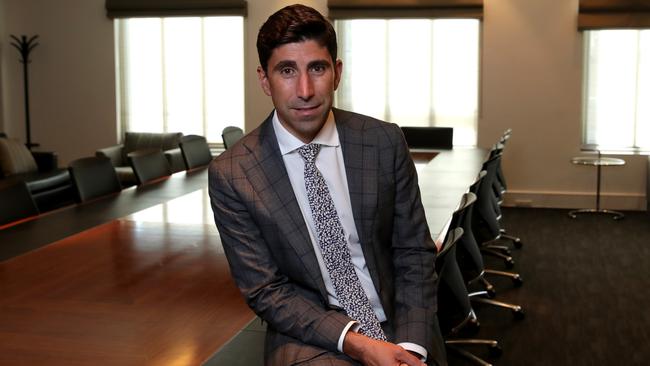
Gerard Cockburn 11.30am: ANZ capital position weaker than tipped: UBS
Investment analysts at UBS have given their first impression of ANZ’s interim results, saying the market is likely to hone in on the bank’s weaker than expected capital position.
UBS flagged ANZ’s common equity tier one ratio at 10.8 per cent was below the brokerage’s consensus of 11.3 per cent, noting the lower than expected result has been caused by institutional drawdowns, which contributed to an 8 per cent rise in risk-weighted assets.
The investment bank questioned whether the drawdowns, predominantly in its forex and lending divisions, will continue to impact its ongoing capital position.
UBS has set a buy rating on the bank, with an unchanged 12-month target price of $21.
“Dividend deferral appears prudent until there is more certainty on the outlook for the economy and asset quality,” UBS analysts said.
ANZ last flat at $16.66.
Read more: ANZ defers dividend as profit dives 60pc
Olivia Caisley 11.19am: One million Aussie to apply for JobSeeker
One million Australians are expected to apply for unemployment benefits as a result of the coronavirus with Department of Social Services officials revealing JobSeeker numbers have risen by 500,000 since the outbreak.
Senior officials told a parliamentary committee into the crisis on Thursday another 400,000 people were expected to apply for the payment, which has been temporarily doubled to assist people during the crisis, by September.
Scott Morrison on Wednesday flagged the emergency payment would be cut by half after six months to meet its pre-coronavirus figure of $40 a day to ensure the federal budget does not blow out further.
But Labor Senator Katy Gallagher told the inquiry her party had serious concerns about the impact of a reduction in JobSeeker on those who have been made unemployed.
Follow all the latest virus news at our live blog
11.14am: TPG fails to secure Singapore licence
TPG Telecom said it failed to secure one of the two licenses for nationwide 5G coverage in Singapore.
The mobile and fixed-line communications provider on Thursday said the Singapore government’s Infocomm Media Development Authority had told it that it will not be allocated 3.5 GHz mobile spectrum.
The Australia-listed firm said local subsidiary TPG Singapore would likely look at its remaining options for the delivery of 5G services.
The IMDA requires that the two successful license holders offer wholesale access to the unsuccessful bidders. It will also allocate some spectrum to operators for localised high-capacity 5G hot spots.
TPM last traded down 2pc to $7.37.
Dow Jones Newswires
11.03am: Shares hold higher by 1.2pc
Australia’s S&P/ASX 200 is higher by 1.2pc after the first hour of trade, just shy of the 8-day high of 5463.9 it hit in early trading.
The index hasn’t been quite as strong as a 1.7pc rise projected by overnight futures relative to fair value but the break above the 61.8pc Fibonacci retracement at 2935 in the S&P 500 suggests Fed liquidity is overwhelming concern about the economy.
The Australian sharemarket now looks set to get dragged substantially higher as the Fed keeps maximum stimulus to drive the US sharemarket up.
Staples have trimmed early losses leaving just health care and utilities in the red but it's the heavyweight iron ore miners and oil producers are the biggest contributors to strength with BHP up 1.9pc and Woodside up 2.7pc, with June WTI up 22pc overnight and a further 5.4pc so far today.
Gold miners are down sharply with Northern Star down 3.5pc after Newcrest launched a $1.1bn capital raising.
10.50am: Bank inquiry good prep for COVID: ANZ
The financial services royal commission of 2018 helped banks to be better prepared to meet the challenges of the COVID-19 crisis, according to ANZ chief executive Shayne Elliott.
In a prerecorded interview released by ANZ, Mr Elliott said the Hayne financial services royal commission which had been critical of bank behaviour allowed banks to focus on “managerial preparedness and a cultural one”.
“I think that coming through the Royal Commission means that actually banks are probably more and more attuned to culture and how we behave,” Mr Elliott said
“We’ve got a real opportunity to show our value to the community here that we can and will do the right thing by customers and that gives us an enormous opportunity. And then at ANZ, I know here we’ve got enormous management experience and depth; people who have been through those crises”.
As an aside, in his final report issued in February 2018 Commissioner Kenneth Hayne noted: “I have little doubt that Mr Elliott, CEO of ANZ, is also well aware of the size and nature of the tasks that lie ahead of ANZ”.
Earlier Thursday ANZ reported a 60 per cent drop in cash profit to $1.41bn.
ANZ last traded down 0.6pc to $16.56 after lows of $16.23.
Read more: We’re flattening stress curve: ANZ
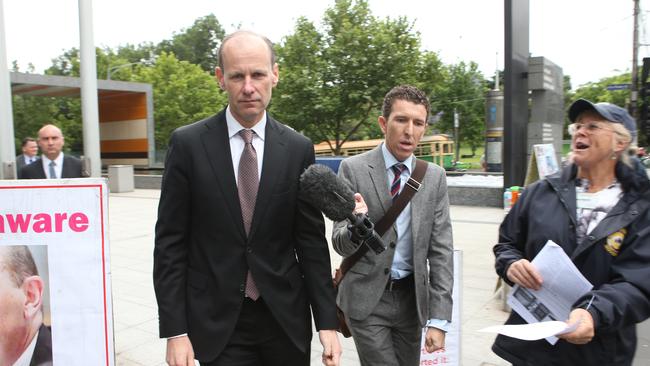
Bridget Carter 10.48am: Ingenia to raise $175m
DataRoom | Ingenia is raising $175m through Goldman Sachs, Citi and Moelis.
The company will raise $150m through a placement and $25m through a security purchase plan.
Of the placement, $135m is underwritten.
Shares are being sold at $3.45 each, a 6.5 per cent discount to their last closing price of $3.69.
The raise represents 18.5 per cent of Ingenia shares on issue.
Funds are being used to grow the company’s asset base, Ingenia said
Ben Wilmot 10.39am: Mirvac warns of drawn out virus hit
Property developer Mirvac has warned the full impact of the coronavirus on its operations is yet to come as it reported a slow down in its residential unit and across its malls.
The company, which pulled its guidance in March, has kept buying residential sites for an eventual recovery but chief executive Susan Lloyd-Hurwitz said pandemic had transformed the world.
“No sector has been untouched by the health and economic crises that have developed,” she said. “We have been impacted across our business, which is why we withdrew guidance in March, and we have still some way to go before we understand the full extent of the impact.”
Ms Lloyd-Hurwitz said Mirvac was working on its development pipeline, exploring a range of additional opportunities, in order to expedite the recovery process.
MGR last up 2.9pc to $2.16.
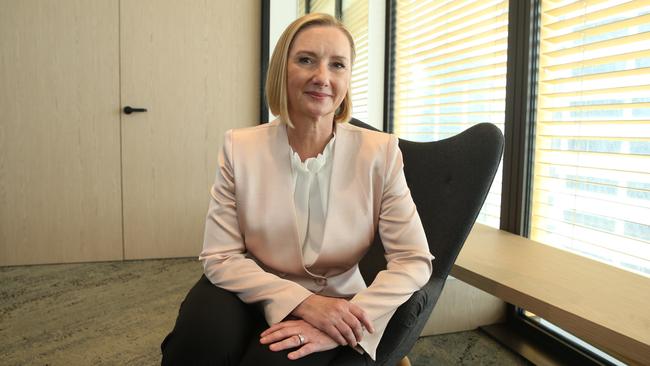
10.33am: Front line Woolies staff set for bonus
Woolworths chief executive Brad Banducci says front line supermarket staff are in line for a bonus payment at the end of the financial year given their efforts during the COVID-19 crisis.
“Our team have played a critical role during these unprecedented times and while the outlook for the rest of the financial year is uncertain, we remain in a strong operational and financial position,” Mr Banducci says as the retailer reports a 10.7pc jump in third quarter sales to $16.5bn.
“This has been a real team effort and we expect to pay a recognition bonus to our permanent frontline team members at the end of the financial year to reflect their over-and-above efforts.”
Read more: Virus costs weighing on Woolies
10.12am: Hope of virus treatment lifts ASX
Optimism of a potential coronavirus treatment is helping the ASX to put on as much a 1.3pc in early trading, with gains across most sectors.
At the open, the ASX200 is higher by 58 points or 1.1 per cent to 5451.5, that's after hitting as much as 5463.9.
Energy is the key outperformer, up 4.5pc after further rebound in WTI futures overnight while Staples is dragging under the weight of a 1.8pc drop in Woolworths after its latest update.
ANZ is the only of the major banks to trade in the red – last down 1.7pc – as its weak first half update and dividend deferral rattles investors.
9.51am: Ingenia joins list of capital raisings
Aged care and tourism accommodation provider Ingenia has joined a growing list of capital raisings, this morning going into a halt for a potential capital raising including a placement and share purchase plan.
In a filing to the market, it said it was conducting a book build process “for a significant issue of securities”.
“The book build process is scheduled to take place over the course of one trading day and overnight, with an announcement about the results scheduled to be made before the commencement of trading on Friday 1 May 2020,” the company said.
INA last at $3.69.
Ben Wilmot 9.43am: GPT pauses projects as mall sales flop
Diversified property landlord the GPT Group has revealed a dramatic fall off in its shopping centre business in March and put key retail and office projects on hold in Sydney and Melbourne as it looks to combat the coronavirus crisis.
The update is one of the first by a major property company and it is also dealing with stressed tenants chasing rent relief, both under the Morrison government’s commercial property code, and those outside its range.
But in a sign it is unlikely to tap the market for equity, GPT has $1.27bn of available liquidity in cash and undrawn bank facilities, with less than $5m of debt maturing through to December 2021.
The company pulled its earnings and distribution guidance in March and said it would get all its investment properties independently valued at June 30.
GPT said before the COVID-19 struck retail sales had shown positive momentum with monthly combined specialty sales up 3 per cent in January and up 4.9 per cent in February on a year-on-year basis.
But the mid-March measures to contain the coronavirus slashed foot traffic and many stores closed. Monthly combined specialty sales plunged by 27.3 per cent and overall centre monthly sales were off by 21.3 per cent. Supermarkets by contrast surged and monthly sales were up 19.7 per cent.
GPT last traded at $3.93.
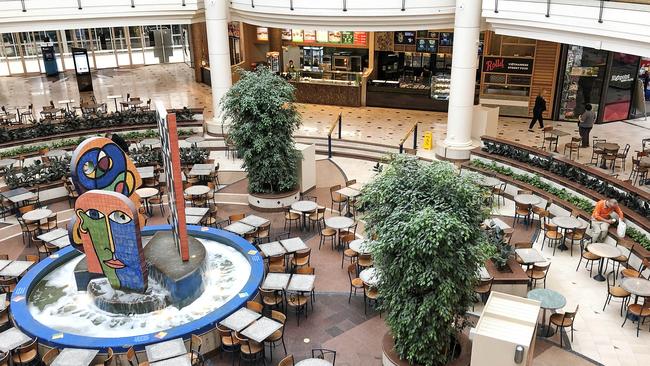
Nick Evans 9.38am: Newcrest buys into Ecuadorean gold mine
Newcrest Mining has launched a $1bn capital raising at $25.60 to fund the acquisition of a royalty stream from Lundin Gold’s Fruta del Norte gold project in Ecuador, and to fund early work on its own growth projects.
Australia’s biggest gold miner said on Thursday it will spend $US460m on a royalty stream worth 34 per cent of the mine’s free cash flow over the next five years, including a 218,500oz gold pre-pay facility and streaming facility worth 7.75pc of refined gold processed in the preceding month, multiplied by the excess of the spot gold price over $US400/oz, until 350,000oz is reached.
Fruta del Norte is temporarily closed amid the coronavirus crisis, but Canada’s Lundin declared in February the mine had achieved commercial production.
Newcrest Managing Director Sandeep Biswas acquisition is expected to provide Newcrest with exposure to approximately 400,000 ounces of gold from the mine between 2020 and 2026.
“The purchase of these gold prepay and stream facilities and the offtake agreement increases our direct exposure to the cash flow generated by the Tier 1 Fruta del Norte mine, in-line with our stated growth strategy,” he said.
Newcrest has acquired the finance facilities of @LundinGold's Tier 1 #FrutadelNorte mine for US$460 million. Our investment in the facilities offers additional cash flow exposure to ~1.9moz of gold over the life of the mine. $NCM $LUG $LUG.CA
— Newcrest Mining (@NewcrestMining) April 29, 2020
Eli Greenblat 9.36am: Red Bull sales boosted
Energy drink brand Red Bull continues to win from the shift of supermarkets into catering to the convenience category, with sales of the brightly coloured drink rising to $212.078 million in 2019 up from $196.273 million in 2018.
Accounts lodged with the corporate regulator show that Red Bull Australia posted a slightly stronger profit of $10.45 million for calendar 2019, up from $9.227 million in 2018.
Red Bull, the global juggernaut energy drink founded by Austrian entrepreneur Dietrich Mateschitz, has discovered a rich vein of customers in Australia — especially those aged between 18 and 29 — and is the nation’s biggest-selling brand in the space.
Red Bull’s market share floats between 37 and 38 per cent, followed by V with a 31 per cent stake. Coca-Cola Amatil’s Mother and Monster are ranked third and fourth with shares of roughly 15 and 8 per cent respectively. Industry growth was about 5 per cent.
Bridget Carter 9.32am: Qube raising $500m
DataRoom | Logistics company Qube Holdings has announced the terms of its equity raising.
The company will raise $500m through UBS and Bank of America by way of an entitlement offer, where shareholders receive 1 share for every 6.35 that they already hold.
Shares are being sold at $1.95 each, an 11.8 per cent discount to the last closing price of $2.20.
It comes after The Australian revealed on Sunday that Qube was raising $500m.
The funds are being used to strengthen the group’s balance sheet and enable it to pursue growth opportunities.
9.22am: US optimism to fuel local rally
The local market is readying for a solid jump at the open, after US stocks soared to their best level in seven weeks.
Futures relative to fair value suggest an early lift of 1.7pc though that could be trimmed somewhat by weak first half results from ANZ.
Positive trial results from US pharma group Gilead were the key driver of global optimism, along with reports that the US FDA would be fast-tracking approvals for the drug.
Hope is that if the drug is found to be a successful treatment, it could facilitate a quicker and greater rollback of containment measures.
Alongside that, WTI soared by 23pc, which should support the local energy sector too.
Markets have seemingly looked through the FOMC meeting and first quarter GDP, both largely coming in as expected.
Eli Greenblat 9.09am: Woolworths braces for challenging eco outlook
Woolworths has warned that it is bracing for a more challenging medium-term economic outlook in the wake of the coronavirus pandemic as the retailer swallows a number of costs including the closure of all its hotels which are generating losses of up to $35m a month since March.
The supermarkets group also said this morning it was staring down the barrel of up to $275m in incremental costs as it reacted to the health crisis that has seen it incorporate costly new cleaning, hygiene and other work practices and take on thousands of new staff to deal with the massive shifts in consumer behaviour through the pandemic.
The nation’s biggest supermarket confirmed the strength of panic buying through March and April at its supermarkets, and as witnessed by Coles, as shoppers stripped essential products from the shelves with Woolworths posting a record 11.3 per cent rise in food sales at its Australian supermarkets to $11.171 billion.
Read more: Coles sales consolidate after COVID boom
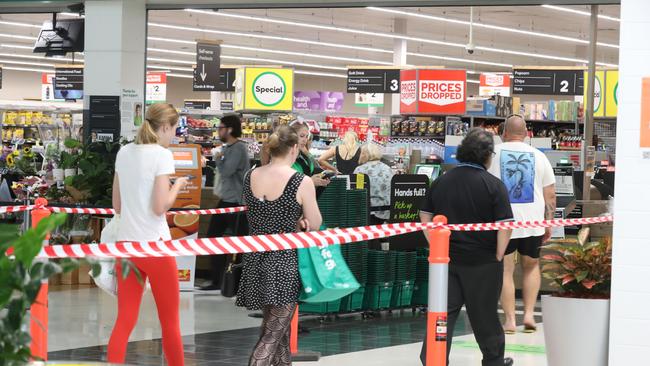
9,05am: What’s on the broker radar?
- Coles Group raised to Buy – Citi
- Coles Group raised to Buy – Shaw and Partners
- Coles Group raised to Hold – Morgans
- Credit Corp raised to Add – Morgans
- Domain Holdings cut to Hold – Morningstar
- GWA Group cut to Hold – Morningstar
- GrainCorp cut to Underweight – Wilsons
- Lendlease cut to Hold – Morningstar
- Lendlease raised to Buy – UBS
- Premier Investments cut to Hold – Morningstar
- Regis Resources cut to Neutral – JP Morgan
- Tabcorp cut to Neutral – Credit Suisse
- United Malt cut to Hold – Bell Potter
- United Malt rated new Overweight – Wilsons
- Vocus cut to Hold – Morningstar
Bridget Carter 8.54am: Newcrest launches $1bn placement
DataRoom | Newcrest Mining has launched a $1bn placement through Macquarie
Capital and RBC Capital Markets.
Shares are being sold at $25.60, a 7 per cent discount to the last closing price of $27.54.
The raise represents 5.1 per cent of the Newcrest shares on issue.
The funds are being used to increase the exposure to gold production at Lundin Gold’s Fruta del Norte mine through the acquisition of a package of finance facilities and other growth projects, according to a term sheet sent to investors.
A $100m share purchase plan is also being launched.
8.51am: $900m of ANZ dividends in limbo
At least $900m worth of ANZ interim dividends remain up in the air, as the bank earlier Thursday said it would defer decision on payment until August in light of the tough economic environment.
While ANZ hasn’t disclosed the dividend payout, using a conservative payout ratio of 64 per cent which was used by the bank in the March half last year if this was applied to the 1H2020 half cash profit from continuing operations of $1.41bn this represents $904m.
In March and September half last year ANZ paid respective dividends of $2.27bn – but this was on a much higher profit.
ANZ chairman David Gonski is at pains to point out the deferral of dividend is not about the bank’s current financial position rather it is in line with guidance from bank regulator APRA that all banks should delay decisions on dividends until COVID-19 economic picture is clearer.
“The Board agrees with the regulator’s guidance that deferring a decision on the 2020 interim dividend is prudent given the present economic uncertainty and that making a decision at this time would not have been appropriate,” Mr Gonksi said.
“This was a very difficult decision and the Board considered all options available as we understand the impact this will have on those shareholders who rely on dividends,” Mr Gonski said.
Read more: ANZ defers dividend as profit dives 60pc
8.38am: Fortescue upgrades shipments guidance
Fortescue Metals raised its guidance for annual iron-ore shipments following a record third-quarter performance, as demand for the steelmaking commodity remained resilient despite the economic impact of the novel coronavirus.
Fortescue said it now expects to ship between 175 million tonnes and 177 million tonnes of iron ore in the year through June. That outlook represents an improvement on its prior shipment target of 170 million-175 million tonnes.
“Fortescue’s strong operating performance in the March quarter has delivered record shipments, increasing 10pc compared to the prior comparable quarter, and a 2pc reduction in C1 costs maintaining our industry leading cost position,” said Chief Executive Elizabeth Gaines.
Fortescue shipped 42.3 million tonnes of iron ore in the three months through March, with cash costs falling to $US13.27/tonne.
Dow Jones Newswires
Gerard Cockburn 8.25am: ANZ counts cost of virus
Some 105,000 mortgage customers representing $36bn worth of home loans have rushed ANZ for a request for assistance, the banking major revealed Thursday.
The big four lender outlined the stark cost of the COVID-19 crisis on the economy as it also said some 15 per cent of its small to mid-sized business customers – representing loans of $7.5bn – had requested repayment deferrals.
The comments came as ANZ reported a 60 per cent drop in first half profit to $1.41bn, and deferred its dividend payment to until at least August.
ANZ also revealed a $1.03bn bad debt charge specifically related to COVID-19-related impairments. Earlier this week Westpac said it was expecting a $1.7bn charge for COVID-19 linked losses and National Australia Bank said it was bracing for more than $800m of losses.
8.15am: Newcrest in halt for raise, buy
Newcrest Mining shares have gone into a trading halt ahead of an announcement of a “material acquisition” and an equity raising.
The raising is to be through an institutional placement and a share purchase plan.
The halt is in place until an announcement, or by the start of trading on May 4.
7.46am: ANZ cash profit plunges 60pc
ANZ has posted a 60 per cent fall in half year cash net profit, to $1.41 billion.
It also says it has deferred a decision on the 2020 interim dividend until the impact of the coronavirus pandemic becomes clearer.
Statutory profit after tax was $1.55bn, down 51 per cent.
ANZ says the decline was driven primarily by credit impairment charges of $1.67bn, including increased credit reserves for the impacts of COVID-19 of $1.03bn.
The valuation of investments in Asian associates was impaired by $815m, largely due to the impact COVID-19.
ANZ CEO Shayne Elliott called the result “reasonable” given the tough trading conditions being experienced before the crisis hit.
“We maintained our focus on productivity and continued to target balance sheet growth in our preferred segments. Loan losses heading into March were at historically low-levels and we are well positioned to manage the higher credit charges taken as a result of COVID-19.
“COVID-19 has clearly impacted our performance, however the work done over many years to simplify our business, strengthen our balance sheet as well as developing a more agile and resilient workforce meant we were well-prepared to support customers through the crisis and I’m confident we will emerge even stronger.”
Cash earnings per share decreased 60 per cent to 50 cents.
ANZ says it entered the crisis with a strong capital position. It Common Equity Tier 1 Capital Ratio is 10.8 per cent at March 31. 2020. Return on equity decreased to 4.7 per cent.
Read more: ANZ defers dividend as profit dives 60pc
7.25am: ASX to gain on virus drug hopes
Shares on the Australian market are set for gains after US stocks surged overnight after promising results for a COVID-19 treatment.
At 7am (AEST) the Australian SPI 200 futures contract was up 108 points, or 2.01 per cent, at 5,468.0 points.
Big tech companies provided the biggest lift to the US S&P 500 and the Nasdaq, and pushed all three major US stock averages closer to their all-time highs reached in February.
Drugmaker Gilead Sciences announced that its drug remdesivir is showing promise as an effective treatment for COVID-19, which has killed more than 226,000 people across the world.
The drug news boosted the broader market and sent Gilead shares up 5.7 per cent.
On the home front, ANZ and Bank of Queensland are expected to publish first half results.
Woolworths is also scheduled to provide its third quarter supermarket sales update, which will be boosted by panic-buying from the coronavirus pandemic. Coles on Wednesday said its third quarter supermarket sales jumped by 13 per cent, but its share price finished 4.4 per cent lower when the market closed.
The S&P/ASX200 benchmark index finished higher on Wednesday, closing up 80.3 points, or 1.51 per cent, at 5,393.4.
The All Ordinaries index finished 82.6 points higher, or 1.53 per cent, at 5,463.8.
One Aussie dollar was buying US65.56 cents, up from US65.36 cents at Wednesday’s close.
AAP
7.20am: Oil gains
Oil prices surged more than 10 per cent after US crude stockpiles grew less than expected and gasoline posted a surprise draw, feeding optimism that fuel consumption will recover as some European countries and US state ease coronavirus lockdowns.
Crude prices crashed earlier this month, with global fuel tanking roughly 30 per cent due to efforts to slow the spread of the virus.
To ease the growing glut, major oil producing-nations agreed in mid-April to cut output by nearly 10 million barrels per day.
Shale producers and oil majors are also reducing production. US West Texas Intermediate crude futures settled at $US15.06 a barrel, jumping $US2.72, or 22 per cent.
Brent crude futures settled at $US22.54 a barrel, up $US2.08, or 10.2 per cent.
Reuters
6.58am: Norway to cut oil production
Norway said it will cut oil production to the end of the year to help stabilise slumping prices hit by a supply glut and a collapse in demand sparked by the coronavirus pandemic.
Output will be cut by 250,000 barrels per day in June and by 134,000 barrels over the rest of the year, the oil and energy ministry said in a statement.
AFP
6.55am: Microsoft sees digital reboot
Microsoft said profits rose sharply in the just-ended quarter which forced the technology giant to scramble to keep its customers connected during the coronavirus lockdowns.
The US technology giant said the full impact of the pandemic was not reflected in its results for the fiscal third quarter to March 31.
But it said it was forced to adapt quickly as businesses and consumers moved into lockdown due to the global health emergency.
“We’ve seen two years’ worth of digital transformation in two months,” chief executive Satya Nadella said. “From remote teamwork and learning, to sales and customer service, to critical cloud infrastructure and security — we are working alongside customers every day to help them adapt and stay open for business in a world of remote everything.”
Microsoft, the most valuable tech firm, said profits in the quarter rose 22 per cent from a year ago to $US10.8 billion. Revenue rose 15 per cent to $US35 billion with “minimal net impact” from the COVID-19 outbreak, the company said.
AFP
6.45am: Tesla surprises Wall St
Tesla posted a small first-quarter net profit just as the coronavirus started to affect the electric car and solar panel maker.
The company said it made $US16 million from January through March, or 8 cents per share. It was the third straight profitable quarter for the Palo Alto, California, company.
It appears the virus may force Tesla to dial back its forecast produce more than 500,000 vehicles in 2020. Although the company said it has the capacity to make a half-million vehicles, it’s uncertain how quickly its California plant can ramp up after being shut down due to the virus.
Excluding one-time items, Tesla learned $US1.24 per share. That easily beat Wall Street estimates of a 28-cent-per-share loss, according to Factset.
The profit came as the virus forced Tesla to shut down its Fremont, California, assembly plant late in the quarter on March 23, cutting into production and sales as the plant was starting to crank out the new Model Y SUV. Yet the company reported stronger-than-expected first quarter global sales. Tesla delivered 88,400 vehicles during the first three months of the year, a 40pc increase from a year ago. That was aided by production at its new factory in Shanghai.
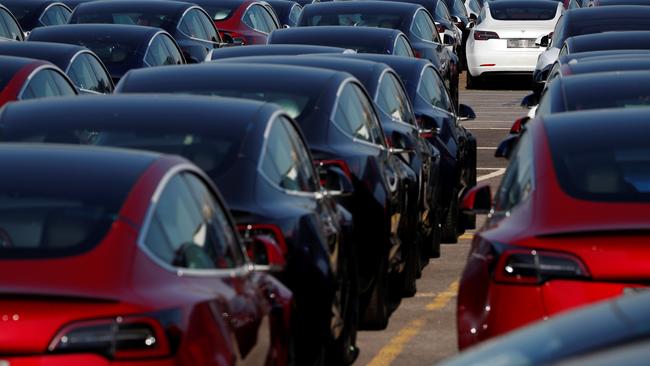
AP
6.40am: Facebook rides surge in usage
Facebook reported strong growth in the first quarter despite disruptions from the COVID-19 pandemic, with a swell in homebound users helping compensate for a fall-off in ad pricing.
Facebook brought in $US17.7 billion in revenue in the first quarter, typically its lightest, up from $US15.1 billion a year ago and beating analyst projections of $US17.3 billion, according to FactSet.
The company reported earnings of $US4.9 billion, or $US1.71 per share, coming in just under the $US1.74 per share that analysts expected. That number was far higher than the $US0.85 a share the company reported a year ago, which was depressed by reserves for the company’s $US5 billion privacy settlement with the Federal Trade Commission.
Following the earnings report, Facebook shares rose 7pc in after-hours trading, bringing the price close to where it began the year. The results were in keeping with the relatively strong earnings from Alphabet and Snap, digital advertising-based businesses that have already reported their first-quarter results.
Dow Jones Newswires
6.20am: Wall St rallies on drug optimism
Wall Street stocks ended a bullish session sharply higher on hopes of continued Federal Reserve stimulus and positive signs about a coronavirus treatment under development.
The Dow Jones Industrial Average finished up 2.2 per cent at 24,633.86, while the broadbased S&P 500 gained 2.7 per cent to 2,939.51.
Meanwhile, the tech-rich Nasdaq Composite Index jumped 3.6 per cent to 8,914.71.
After lifting yesterday on hopes of a lift on restrictions, Australian stocks are set for a strong rise at the open. At 6am (AEST) the SPI futures index was up 80 points, or 1.5 per cent.
The heady US session came after government data showed the US economy shrank by a whopping 4.8 per cent, the biggest decline in 12 years and a harbinger of what are expected to be even worse results in the second quarter.
But the market has been cheered by the Fed’s muscular response to the crisis, said Art Hogan, chief market strategist at National Securities, and hopes have been raised by the economic comeback in China and other markets that have faced COVID-19 outbreaks.
“Investors are sensing that there’s an end to it,” Hogan said. “The market is looking ahead to the fourth quarter and thinking it’s going to be better than the second quarter.” The Fed had already unveiled a broad slate of programs, including some for the first time.
Chair Jerome Powell said the Fed is “committed to using our full range of tools to support the economy.”
The market also got a boost from comments from top government scientist Anthony Fauci and Gilead Sciences indicating promising clinical trials of the company’s treatment for COVID-19.
Remdesivir has a “clear-cut” effect in helping COVID-19 patients recover, Fauci said, hailing it as proof that a drug can block the coronavirus. Shares of Gilead jumped 5.7 per cent.
Google parent Alphabet surged 8.7 per cent as the company’s results outshone dim earnings expectations.
Overall ad revenues for Google rose 10 per cent for the quarter even as the pandemic worsened in March.
The results lent momentum to Apple, Amazon and other tech giants that are set to report results in the coming days and won big gains.
Boeing jumped 6.0 per cent despite reporting a $US641 million loss as the company announced a plan to cut its workforce by 10 per cent and expressed confidence it had sufficient liquidity to weather a deep downturn in its business due to coronavirus shutdowns.
AFP
5.57am: Fed signals rates hold
The Federal Reserve signalled that it will keep its key short-term interest rate near zero for the foreseeable future as part of its extraordinary efforts to bolster an economy that is sinking into its worst crisis since the 1930s.
As part of its emergency steps, the Fed said it will also keep buying Treasury and mortgage bonds to help keep rates low and ensure that companies can continue to lend easily to each other amid a near-paralysis of the economy caused by the coronavirus.
It did not specify any amounts or timing for its bond purchases. At a news conference, Chairman Jerome Powell cautioned about any prospects for a swift or a robust recovery, saying, “I would say that it may well be the case that the economy will need further support from all of us if the recovery is to be a strong one.”
In its statement, the central bank said it is “committed to using its full range of tools to support the U.S. economy in this challenging time.” The viral outbreak and measures to contain it,” the policy statement noted, are “inducing sharp declines in economic activity and a surge in job losses.”
AP
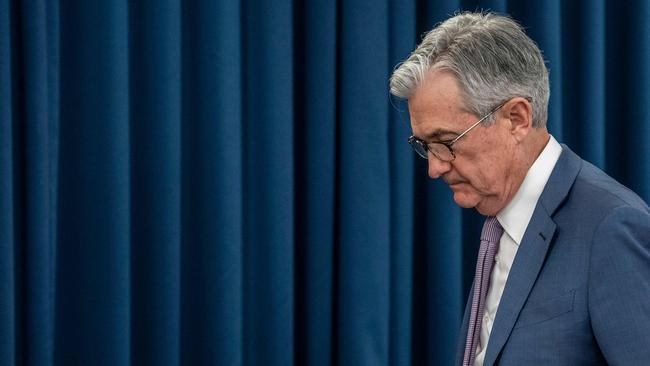
5.55am: Fed warns virus ‘poses considerable risks’
The Federal Reserve said the coronavirus pandemic has already caused “tremendous” health and economic hardship, and warned the damage to the US economy will continue.
The crisis “will weigh heavily on economic activity, employment and inflation in the near term, and poses considerable risks to the economic outlook over the medium term,” the policy-setting Federal Open Market Committee (FOMC) said at the conclusion of its two-day meeting.
The central bank kept the benchmark interest rate at zero, and said it will remain there until the economy has weathered the crisis and is ready to resume growth.
AFP
5.52am: Virgin creditors to meet
Virgin Australia’s creditors will meet on Thursday for the first time as potential buyers eye up the debt-laden carrier after it entered voluntary administration last week.
At least 11 suitors are currently circling as administrators look for a deal to save the beleaguered airliner.
It is estimated nearly $US7 billion is owed to Virgin’s more than 12,000 creditors.
Administrators Deloitte have retained Houlihan Lokey to advise them on restructuring the company and are hoping to pin down a buyer within the next three months.
More than 10 parties have already expressed interest in Australia’s second airline, including Melbourne-based BHG Capital and US private equity firms Apollo Global Management and Oaktree Capital Management.
Shares in Virgin lost nearly 44 per cent of their value in 2020 and were priced at just 8.6 cents per share when the airline suspended trading on the ASX on April 14.
It stood down 8,000 staff last month to try and stay afloat but went into free fall on the back of strict coronavirus travel bans.
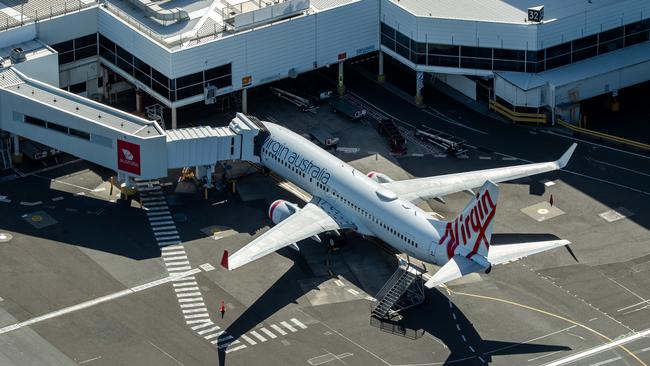
The federal government has repeatedly rejected calls from unions and Labor to buy a stake in the beleaguered airline, with senior ministers instead pressuring Virgin’s major shareholders to step in.
The company is 90 per cent foreign owned with Singapore Airlines, Etihad Airways and Chinese conglomerates HNA Group and Hanshan owning 80 per cent between them while Richard Branson’s Virgin Group still owns 10 per cent. More than 15,000 jobs are at risk should a decision be made to carve off assets to service the airline’s debts.
However, Deloitte partner Vaughan Strawbridge has previously indicated he wants to sell Virgin as a going concern.
AAP
5.50am: Amazon added to ‘notorious markets’ list
The United States for the first time added five of Amazon’s overseas operations to its list of “notorious markets” where pirated goods are sold.
The e-commerce giant dismissed the move as part of the Trump administration’s “personal vendetta” against it.
The Office of the U.S. Trade Representative added the Amazon.com domains in Canada, France, Germany, India and the United Kingdom to its annual blacklist.
USTR cited complaints from U.S. businesses that consumers can’t easily tell who is selling items on the Amazon platforms and that the e-commerce company’s procedures for removing counterfeit goods “can be lengthy and burdensome.”
Amazon fired back with a statement Wednesday: “We strongly disagree with the characterisation of Amazon in this USTR report. This purely political act is another example of the administration using the U.S. government to advance a personal vendetta against Amazon.”
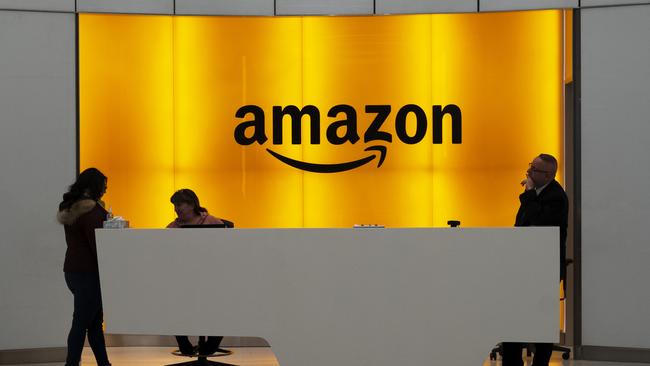
AP
5.45am: Stocks surge on virus treatment hopes
Global stockmarkets shot higher after a US company reported positive results on the use of its antiviral drug Remdesivir against the new coronavirus, which more than offset news of a massive downturn in the American economy.
Meanwhile oil prices spiked, with US benchmark oil WTI soaring by more than a third, following data showing crude stockpiles in the United States rose less than expected.
US and European stocks both advanced after Gilead Science said that remdesivir, one of the most highly anticipated drugs being tested against the new coronavirus, showed positive results in a large-scale US government trial.
It said the National Institute of Allergy and Infectious Diseases would provide more information.
“The US recession is beginning, but financial markets seem to only care about Gilead’s remdesivir,” said market analyst Edward Moya and online currency trading firm Oanda.
“Risk appetite is roaring back on news that positive data came out of the National Institute of Allergy and Infectious Diseases’ (NIAID) study of the investigational antiviral remdesivir for the treatment of COVID-19.” Shares in Gilead Science were up 5.7 per cent in late morning trade in the United States.
Remdesivir is an antiviral medicine and not a vaccine, thus it could help in the treatment of those infected with the new coronavirus but not block new infections — which is key to ending lockdowns and other restrictions that have hammered the global economy.
However another study, this time based on patients in Wuhan, China, believed to be the starting point for the pandemic, showed no significant benefits in patients.
“Investors should know the script by now,” said Chris Beauchamp, chief market analyst at online trading firm IG. “This is a market that ignores or rides out bad news and focuses on the good data, no matter how limited that might be,” he said.
The bad news Wednesday was a worse than expected 4.8 per cent contraction in US first quarter GDP. It was the biggest decline since the Great Recession and ended more than a decade of growth for the US economy.
“The market’s sanguine reaction to the US GDP figure may seem odd, but investors were aware that Q1 would be bad, and indeed are also aware that Q2 will be worse,” said Beauchamp.
London closed up 2.6 per cent, Frankfurt added 2.9 per cent and Paris ended up 2.2 per cent.
AFP
5.43am: US home sales sink 20.8pc
US home sales showed signs of collapsing in March, as the number of contract signs plunged sharply because of the coronavirus outbreak.
The National Association of Realtors said that its pending home sales index, which measures signed buyer contracts, plummeted a seasonally adjusted 20.8pc in March from the prior month to a reading of 88.2.
That is the lowest level since May 2011, when the housing market was still dealing with foreclosures and crashing prices from the Great Recession. Pending sales have fallen 16.3pc from a year ago.
AP
5.40am: Anti-virus drug ‘effective’
A biotech company says its experimental drug has proved effective against the new coronavirus in a major US government study that put it to a strict test.
Gilead Sciences’s remdesivir would be the first treatment to pass such a test against the virus, which has killed more than 218,000 people since it emerged late last year.
Having a treatment could have a profound effect on the global pandemic, especially because health officials say any vaccine is likely a year or more away.
The study, run by the National Institutes of Health, tested remdesivir versus usual care in about 800 hospitalised coronavirus patients around the world. The main result is how long it takes patients to recover.
Gilead gave no details on results, but said an announcement is expected soon.
AP
5.39am: Air traffic drops 53pc
World air traffic suffered a massive drop of more than half in March compared with the same period last year, the airline industry’s trade body said Wednesday.
The 52.9 per cent drop when measured by total revenue per passenger kilometres “was the largest decline in recent history, reflecting the impact of government actions to slow the spread of COVID-19”, said the International Air Transport Association (IATA).
AFP
5.35am: US economy shrank at 4.8pc rate
The US economy shrank at a 4.8pc annual rate last quarter as the coronavirus pandemic shut down much of the country and began triggering a recession that will end the longest expansion on record.
The Commerce Department says the gross domestic product, the total output of goods and services, posted a quarterly drop for the first time in six years.
And it was the sharpest fall since the economy shrank at an 8.4pc annual rate in the fourth quarter of 2008 in the depths of the Great Recession.
Forecasters say the drop in the January-March quarter will be only a precursor of a far grimmer GDP report to come on the current April-June period, with business shutdowns and lay-offs striking with devastating force.
The Congressional Budget Office has estimated that GDP will plunge this quarter at a 40pc annual rate.
AP
5.30am: Barclays takes coronavirus hit
Barclays will take a hit of at least £2.1-billion from the impact of the coronavirus pandemic, the British banking giant said despite assistance from the Bank of England and UK government to help lenders boost lending and keep businesses afloat.
The forecast came as Barclays chief executive Jes Staley hinted at remote working replacing offices full of thousands of workers, even after the spread of COVID-19 ends.
In a results statement, Barclays added that its net profit tumbled by 42 per cent in the first quarter.
The lender said it would suffer a £2.1-billion ($US2.56 billion, 2.36 billion euros) impairment charge.
Profit after tax slumped to £605 million in the three months to the end of March from £1.04 billion in the first quarter of 2019, Barclays said.
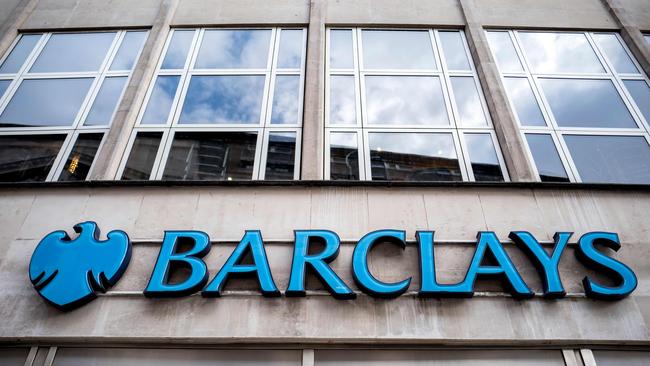
AFP
5.28am: Spotify profits amid virus
Music streaming service Spotify said it had bounced back into profit during the first quarter, posting growing subscriber numbers as much of the world is in lockdown over the new coronavirus.
The net profit of one million euros ($US1.1 million) compares to a loss of 142 million euros a year earlier.
The company reported 286 million active users of which 130 million were paying subscribers, a 31 per cent rise for both from a year earlier.
“Despite the global uncertainty around COVID-19 in Q1, our business met or exceeded our forecast for all major metrics,” the company said in a statement.
Revenue came in at 1.85 billion euros for the quarter, with revenue from premium subscriptions accounting for 1.7 billion.
Posting a narrower operating loss at 17 million euro, compared to 47 million in Q1 of 2019, the company edged out its small profit of one million thanks to improved finance income — which consists of revenue generated by temporary surplus cash invested in short-term investments and securities.
Spotify said it had seen its business impacted by the novel coronavirus starting in late February with a drop in listeners in hard hit markets like Italy in Spain.
However, the company said that “over the last few weeks,” listening had started “to rebound”.
According to Spotify the number of users “grew substantially even during lockdown periods in major markets.” Also standing out was how users had changed their listening habits as a result of worldwide lockdown orders.
“Not surprisingly, we have seen usage in Car, Wearable, and Web platforms drop,” the company said, adding that audience listening through smart TVs and game consoles had “grown materially”.
AFP
5.25am: Boeing to slash staff
Boeing announced sweeping cost-cutting measures after reporting a first-quarter loss of $US641 million following the hit to the airline business from the coronavirus pandemic.
The aerospace giant plans to reduce its workforce by 10 per cent through a combination of voluntary and involuntary lay-offs and will slash production of its main commercial planes, including the 787 and 777, Chief Executive David Calhoun said in a message to employees that accompanied an earnings release.
The quarterly loss of $US641 million compared to profits of $US2.1 billion in the year-ago period. Revenues fell 26.2 per cent to $US16.9 billion.
The loss reflected “abnormal production costs” connected to the temporary suspension of Puget Sound manufacturing operations due to COVID-19 and due to the suspension of production of the 737 MAX, which remains grounded following two deadly crashes.
Boeing said the pandemic crisis has hit demand for new planes and services, with airlines delaying purchases of jets, slowing delivery schedules and deferring elective maintenance.
It will cut production of the 787 from 14 per month to 10 per month in 2020 and gradually to seven per month by 2022.
Boeing also will trim output on the 777 and lower its targets for the 737 MAX.
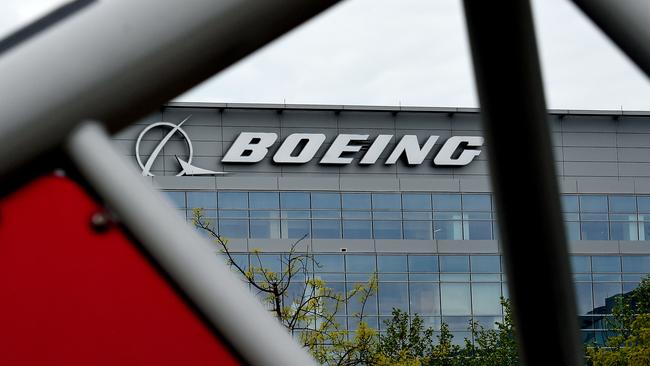
AFP
5.20am: German economy set for slump
The German economy is expected to shrink 6.3 per cent in 2020 because of the coronavirus, Economy Minister Peter Altmaier said, the biggest slump in Europe’s top economy since records began in 1970.
“The effects of the coronavirus pandemic will push our economy into a recession after 10 years of growth,” Altmaier said, adding that the government expected the economy to rebound in 2021.
AFP

